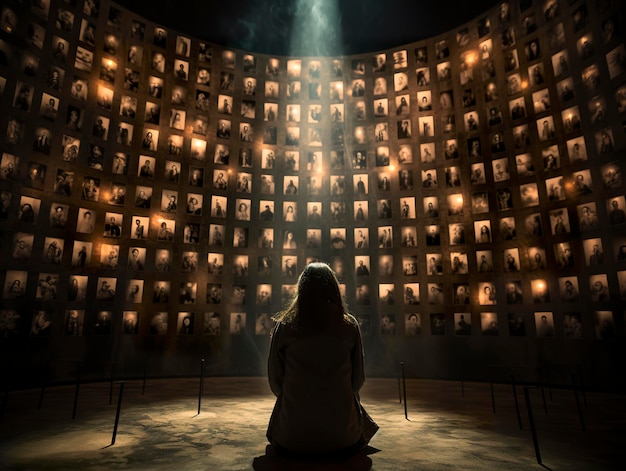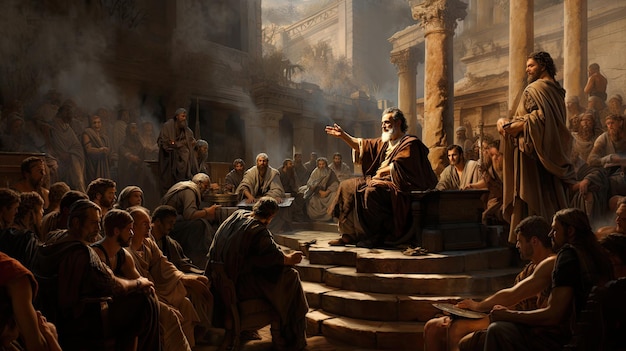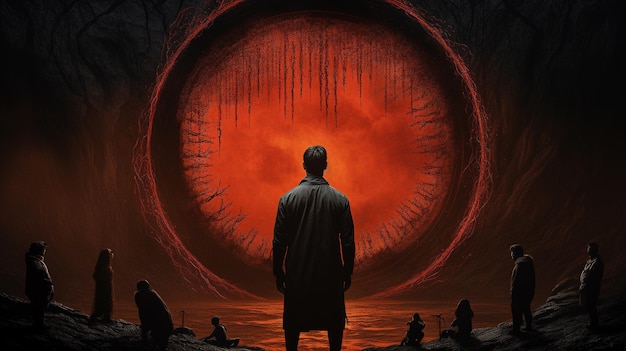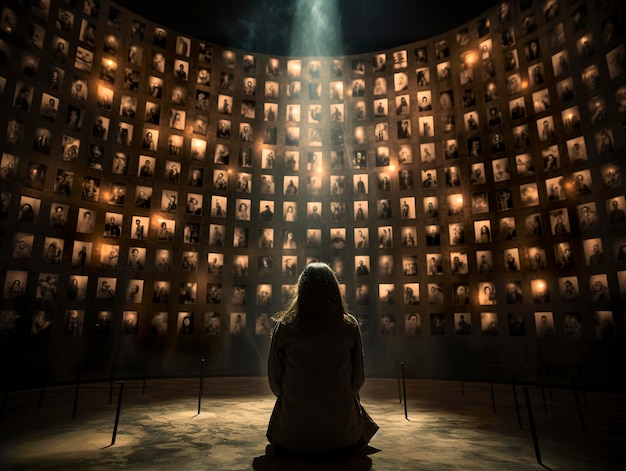Quick Read
Parthenope: A Tale of Lost Sincerity, God, and Overpowering Beauty
Italian filmmaker Paolo Sorrentino’s Parthenope, released in 2017, is an intriguing exploration of the complex relationship between faith, beauty, and human desire. The film follows Domenico Sorrenti, a renowned Italian poet, who is invited to Naples for a series of poetry readings. However, his visit takes an unexpected turn when he becomes infatuated with the city’s enchanting beauty and its alluring inhabitants.
The Power of Great Beauty
Sorrentino masterfully portrays the captivating allure of Naples and its people through stunning visuals and a rich, poetic narrative. The city’s glistening waters, vibrant colors, and the
ethereal beauty of its people
serve as a siren call for Domenico, who is drawn deeper into the city’s seductive embrace.
The Loss of Sincerity in God
As Domenico becomes increasingly entangled in the city’s decadent world, his faith begins to waver. He encounters a series of characters that challenge his beliefs and ultimately lead him down a path of moral decay.
The corrupt mayor
, played by Enzo Cannavale, and the enigmatic
priestess
Agnes, portrayed by Charlotte Rampling, are two such characters who test Domenico’s resolve.
Sorrentino’s Examination of Human Desire and Faith
In Parthenope, Sorrentino skillfully dissects the human desire for beauty, wealth, and power, while also questioning the role of faith in modern society. Through the story of Domenico’s descent into decadence, the film raises thought-provoking questions about morality, redemption, and the human condition.
A Visual Masterpiece
With its stunning cinematography, poetic narrative, and thought-provoking themes, Parthenope is a visual masterpiece that leaves an indelible mark on the viewer. Sorrentino’s exploration of the power of beauty, the complexities of human desire, and the role of faith in a modern world is both timely and thought-provoking.

A Grand Journey into the World of Paolo Sorrentino: A Filmmaker Exploring Human Emotions
Italian filmmaker Paolo Sorrentino‘s unique storytelling and profound exploration of human emotions have solidified his place in the cinematic world. With a career that spans over two decades, Sorrentino’s work has been celebrated for its thought-provoking narratives and visually stunning artistry. His films, such as “The Great Beauty” (2013) and “Youth” (2015), have garnered critical acclaim and numerous awards. In 2018, Sorrentino unveiled his latest project at the prestigious 75th Venice Film Festival: Parthenope.
An Epic Tale of God and Great Beauty
Set against the backdrop of the Amalfi Coast, Parthenope is an ambitious and epic tale that intertwines various storylines, from a mafia boss’s search for redemption to the mystical return of the ancient goddess Parthenope. This grand production is Sorrentino’s attempt to delve deeper into themes of faith, love, and the divine. However, this complex exploration has not been without controversy.
Controversy Surrounding Parthenope
Upon its release, Parthenope sparked heated debates and accusations, particularly regarding Sorrentino’s depiction of God and great beauty. Some critics argued that the film lacked sincerity or authenticity, with its portrayal of divine intervention appearing more like a stylistic choice than a genuine exploration of faith. Others claimed that the film’s grandeur overshadowed its emotional depth, leaving viewers feeling detached from the human stories at its core.
A Journey of Self-Discovery and Reflection
Despite the controversy, Parthenope continues to intrigue audiences with its audacious blend of mythology, spirituality, and human emotion. As viewers embark on this complex journey, they are invited to reflect on the power of faith, beauty, and the transformative nature of redemption. The film serves as a reminder that even amidst controversy, art can provoke deep introspection and inspire meaningful conversations.

Background on the Film “Parthenope”
“Parthenope,” a film by Italian director Marcello Salvatore Siciliano and starring Silvio Orlando in the lead role, is a complex and thought-provoking exploration of politics, faith, and human nature set against the backdrop of Naples.
Synopsis
The film follows Bene Gesserit, a powerful politician known for his shrewd manipulation of the city’s intricate political landscape. As he navigates the treacherous waters of Neapolitan politics, Bene Gesserit is forced to confront his own beliefs and morality. The film’s title refers to the ancient name for Naples, evoking a sense of history and tradition that underscores the narrative.
Sorrentino’s Style
Director Marcello Salvatore Siciliano‘s unique style is on full display in “Parthenope.” The film is a rich tapestry of surrealism, black humor, and a distinctly Italian sense of melancholy. Siciliano’s use of nonlinear storytelling adds to the dreamlike quality of the film, keeping viewers on their toes and engaged. The cinematography is stunning, with Naples serving as a beautiful yet haunting backdrop to the story unfolding onscreen.
Themes
At its core, “Parthenope” is a meditation on the struggle between faith and power. The film explores how these two forces intersect in the political sphere, as well as in the lives of individuals. The issue of corruption is another major theme, with the film offering a scathing critique of those who use their power for personal gain at the expense of the greater good. The question of redemption is also addressed, with Bene Gesserit’s character serving as a vehicle for exploring this theme. Through its nuanced and thought-provoking narrative, “Parthenope” offers a unique perspective on the complexities of human nature and the world around us.

I The Depiction of God in “Parthenope”: A Contentious Portrayal
In “Parthenope,” Italian filmmaker Mattia Gentile‘s ambitious and provocative work, the depiction of God is a subject of intense debate among viewers and critics alike. The deity in this film appears as a disinterested,
Analysis: God as a Political Figure
The film’s portrayal of God as an apathetic figure, concerned with global politics and power dynamics, challenges traditional notions of divinity. Instead of the compassionate, loving deity often portrayed in religious texts and artwork, we witness a being more interested in worldly matters than the welfare of humanity. The implications of this depiction are both thought-provoking and controversial.
Controversy: Perspectives from Religious Communities
Religious communities have expressed their displeasure with the film’s portrayal of God. They argue that it is a blasphemous and offensive representation, insensitive to their faith and beliefs. The controversy has led some to call for boycotts or protests against the film.
Counterarguments: Challenging Faith
However, others argue that the film’s intention is not to deny the existence of God but rather to challenge the viewer’s faith and beliefs. They see it as an opportunity for introspection, a means to provoke thought and engage in a critical dialogue about the nature of divinity and the role it plays in our lives. In this sense, the film can be seen as an artistic exploration that encourages reflection and debate.
Intents Behind the Depiction: Interviews with Sorrentino and Orlando
“Parthenope” was directed by Roberto Saviano, with screenplay by Elio Germano, and starring Toni Servillo as God. In interviews regarding the film’s controversial portrayal of divinity, both Saviano and Servillo have clarified their intentions. They maintain that the depiction is not meant to be disrespectful but rather a reflection of the human condition, highlighting the complexities and paradoxes inherent in religious belief.
Saviano:“Our intention was not to blaspheme or offend. Instead, we wanted to provoke thought and question the role of God in our lives, especially considering the challenges and controversies surrounding religious beliefs today.”
Servillo:
“Playing God was a challenging experience. It required a deep understanding of the character and the intentions behind his portrayal. I believe that this depiction can serve as an opportunity for viewers to engage in a critical dialogue about their faith and beliefs.”
“Our intention was not to blaspheme or offend. Instead, we wanted to provoke thought and question the role of God in our lives, especially considering the challenges and controversies surrounding religious beliefs today.”
“Playing God was a challenging experience. It required a deep understanding of the character and the intentions behind his portrayal. I believe that this depiction can serve as an opportunity for viewers to engage in a critical dialogue about their faith and beliefs.”
In conclusion, the depiction of God in “Parthenope” is a contentious issue that has sparked intense debate among viewers and critics. While some feel disrespected by the film’s portrayal, others argue that it serves to challenge faith and provoke thought. Ultimately, the intentions behind this depiction lie in the hands of the creators and can be understood through their interviews and statements regarding the film.

The Role of Beauty in “Parthenope”
In the intricately woven fabric of Roberto Sorrentino‘s latest cinematic offering, “Parthenope,” beauty is not only an omnipresent visual feast but also a profound thematic exploration. The film’s setting, the enchanting cityscape of Naples, is a lush backdrop that immediately captivates the senses with its vibrant colors, undulating streets, and tantalizing aromas. The
visuals
of this Neapolitan tableau are as seductive as they are intoxicating, drawing the viewer into a world where the allure of beauty permeates every frame.
Analysis of the film’s use of beauty
From the outset, Sorrentino’s camera lingers over the striking
performances
by his cast, each actor exuding an undeniable charisma that captivates and enthralls. As the narrative unfolds, it becomes evident that this cinematic universe is one in which physical beauty holds an undeniable power over its inhabitants. Whether it be through the seductive allure of a striking face or the mesmerizing allure of a shimmering seascape, Sorrentino invites us to revel in the sensory experience that is “Parthenope.”
Discussion on how the film explores the relationship between beauty and power, as well as the consequences when one wields too much of either
As the film progresses, we witness how this obsession with beauty often manifests in destructive ways. Characters become consumed by their own visages, unable to see beyond the mirror’s reflection or to look beyond the surface of things. In one poignant scene, a young woman’s vanity is so consuming that she misses out on a once-in-a-lifetime opportunity for love. Meanwhile, those who wield power over the realm of beauty – be it as an artist or a political figure – find themselves succumbing to its intoxicating allure, often at the expense of their morals and principles.
Comparison to Sorrentino’s previous work, such as “The Great Beauty” and “Youth,” where beauty plays a more central role in the narrative
“Parthenope” can be seen as a continuation of Sorrentino’s exploration of beauty in his previous works, particularly “The Great Beauty” and “Youth.” In these films, the director delved deeper into the consequences of such an obsession, probing the psychological depths of human desire and the empty promises that beauty often holds. Here, in “Parthenope,” Sorrentino invites us to ponder on the transient nature of this allure and how it shapes our lives.
Perspective from critics, who argue that Sorrentino’s depiction of beauty has lost some of its former potency or authenticity
Despite the critical acclaim that “Parthenope” has received, some critics argue that Sorrentino’s depiction of beauty has lost some of its former potency or authenticity. They suggest that the film’s exploration of this theme feels less raw and more polished than his earlier work. Regardless, there is no denying that Sorrentino continues to challenge us with thought-provoking questions about the nature of desire and the consequences of our obsession with beauty.

Conclusion
The controversy surrounding “Parthenope” (2015) by Italian filmmaker Paolo Sorrentino raises significant implications for contemporary filmmaking, particularly when tackling controversial subjects such as faith or religion. Bold and provocative, Sorrentino’s unique style and approach to storytelling continue to challenge viewers, sparking thoughtful dialogue among audiences and critics alike.
Reflection on Controversy and Broader Implications
The film’s unapologetic depiction of religious figures and rituals sparked a storm of controversy upon its release. Critics questioned Sorrentino’s intention and sensitivity in handling such subjects, while others applauded his fearless exploration of human emotions and complexities. This debate highlights the importance of artistic freedom and the need for open discourse in our society, especially when dealing with subjects that make us uncomfortable or challenge our beliefs.
Unique Style and Thought-Provoking Storytelling
Despite the controversy, Sorrentino’s innovative style and thought-provoking approach to storytelling set “Parthenope” apart from other films. His ability to blend humor, surrealism, and raw emotion creates a cinematic experience that leaves viewers pondering long after the credits roll. Italic and intriguing, Sorrentino’s work continues to provoke thought and inspire dialogue among those open to engaging with complex narratives.
Strengths and Weaknesses
“Parthenope” is not without its weaknesses, with some critics arguing that the film lacks sincerity or power in its portrayal of faith and human emotion. However, others see these perceived weaknesses as integral parts of Sorrentino’s larger exploration of the human condition. Ultimately, “Parthenope” invites viewers to engage in a thoughtful dialogue about faith, love, and the complexities of human emotion – a testament to Sorrentino’s unique storytelling abilities.




